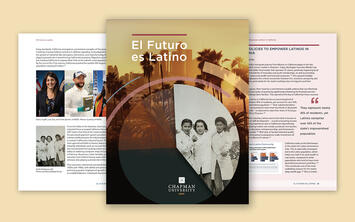
This newly released report covers the challenges and successes of Latinos, their history in California, and present day role in the economy. Soledad Ursúa is the principal researcher for this project; contributors include Jennifer L. Hernandez on housing; Karla López del Río on policy, and Sen. Gloria Romero (Ret.) on education. Below is an excerpt from the report.
Key Findings:
From 2010 to 2020, the Latino populace has witnessed a notable uptick of 23%, presently constituting 62.1 million individuals, equivalent to 18.7% of the overall U.S. population. Within California, this demographic has experienced rapid expansion, now representing nearly 40% of the state’s population, with much potential for economic and social progress, but their prospects are marred by various challenges.
The Livelihood of Latinos: Vulnerabilities Amidst Sacramento’s Environmental and Regulatory Policies: Latinos hold a significant presence in California’s economic landscape, particularly in agriculture, manufacturing, logistics, and construction. Pivotal players within the state’s ‘carbon economy’, they are most threatened by California’s draconian carbon-neutrality initiatives.
Challenges in Housing Affordability for Latino Families: Homeownership bears profound cultural and aspirational significance for Latinos, optimizing familial stability and the realization of the American Dream. But the dream of homeownership has become increasingly elusive for many Latino families within California, due to exceedingly high costs, and the state’s stringent environmental regulations. Today California’s Latino homeownership rate ranks an abysmal 41st nationwide.
Challenges in California’s Education System and Implications for Latino Mobility: Constituting 56.1% of California’s public-school demographic, Latino students are falling behind both their counterparts elsewhere and other ethnic groups in state. Recent testing data a indicates that merely 36.08% of Latino students met or exceeded proficiency benchmarks in English Language Arts (ELA), with an even lower 22.69% achieving similar standards in mathematics. Latino students in the state exhibit an average score 27 points lower than their White counterparts, underscoring the entrenched disparities within the educational framework.
Potential for Political Engagement and Influence: Despite commendable strides in Latino voter turnout, between 2000 and 2020, Latino voter turnout nearly tripled, a sizable proportion of eligible voting-age Latinos in California, estimated at approximately 4 million individuals, abstain from participating in the electoral process, signaling untapped potential for political influence.
Optimism and Resilience Among Latinos: Latinos exhibit a notable penchant for optimism regarding the future far more than their non-Latino counterparts. Latinos steadfastly retain their faith in and reverence for the American Dream, with a majority expressing confidence in their ability to attain it. When queried about the paramount factors contributing to success in the United States, an overwhelming 94% cited ‘a strong work ethic and diligent labor’.
Read/download the full report.
About the Authors:
Soledad Ursúa is the Principal Researcher for this project. Soledad is Principal at Orinoco Equities and is a member of the board of directors of the Venice Neighborhood Council in the Los Angeles area. Her undergraduate degree from University of California Santa Barbara was in Global and International Studies and Spanish. She has a master’s in finance from the New School and worked in the New York venture capital industry.
Jennifer L. Hernandez (housing) has practiced land use and environmental law for 40 years, and leads Holland & Knight’s West Coast Land Use and Environmental Group. Ms. Hernandez is the longest-serving minority board member (23 years) of the California League of Conservation voters, was appointed by President Clinton to serve as a trustee for the Presidio National Park in San Francisco, serves on the board of directors for Sustainable Conservation, and teaches environmental justice at the Univeristy of Southern California Law School. Ms. Hernandez graduated with honors from Harvard University and Stanford Law School. She and her husband live in Berkeley and Los Angeles.
Karla López del Rio (policy) is dedicated to empowering working families to achieve their potential. She actively leads as a community development executive, grounding her research in real-world experience to drive equitable public policies that foster financial wellness, upward mobility, and wealth creation. Her innovative approach generates public-private partnerships that promote civic engagement and attract multi-million dollar investments to Southern California’s low- and moderate-income neighborhoods. A native of Mexico City, Karla currently works as Executive Director of Riverside County’s Community Action Partnership, serves on Chapman University’s Center for Demographics and Policy Advisory Board, and holds a Bachelor’s degree in Development Studies from UC Berkeley. Her work has earned numerous awards from esteemed institutions at the local, state, and national levels.
Sen Gloria Romero (Ret.) (education) was elected to the 24th Senate District in 2001 and served as Senate Majority Leader—the first woman to ever hold that leadership position in the history of the California State Senate. Romero holds a PhD in Social/Personality Psychology and is Professor Emeritus at California State University, Los Angeles. She is the author of California’s groundbreaking Romero Open Enrollment Act, also known as the “Parent Trigger” law, which provides opportunities for school choice for parents of children trapped in chronically academic under-performing, failing schools. She is the co-founder of the innovative independent charter school, Explore Academy, in Orange County, California.












